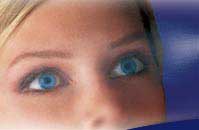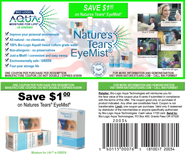Home
Eye Care News

Press Release
Eye Dehydration and Re-hydration
Understanding Dry Eye
"Hydration," refers to the natural moisture in skin, eyes, breathing passages, etc., essential for healthy functioning. "Dehydration" is the loss of that natural moisture, often to the detriment of health. Recent discoveries offer new ways for individuals to re-hydrate their eyes and skin.
Loss of moisture in the skin, eyes and breathing passages can weaken resistance, impair functioning and lead to numerous diseases and/or health conditions. Dehydration related health issues include dry eye syndrome, dry and/or chapped skin, dry mouth, computer eye strain (computer vision syndrome), contact lens dryness, allergies, viral and sunburn sensitivity, adult acne, dermatitis, Sjogren's syndrome, lupus, scleroderma, and cancers of the skin and eyes.
In the past 20 years, the incidence of dehydration related health problems has increased dramatically. Bio-Logic Aqua Research attributes this to multiple causes:
- Indoor "climate control" conditions such as forced-air heating and cooling, insulated walls and windows, low indoor humidity, etc. This includes cars as well as buildings, and especially includes jet airline travel (cabin humidity may be as low as 3%).
- Lifestyle choices and personal habits, including contact lenses, excessive computer use, participation in extreme sports, caffeine and alcohol consumption, not drinking enough water, too much time spent indoors, cigarette smoking, medications, etc.
- Smoke, dust, wind, extreme heat and cold and other outdoor conditions.
- "Global drying," resulting in too little unpolluted and health promoting humidity in the air. Global drying is caused by rapid population growth, air and water pollution, loss of fresh water as land is developed, and possibly global warming and ozone depletion.
Re-hydration is accomplished by:
- Avoiding the above high-risk situations whenever possible and/or taking steps to counteract dryness (such as placing plants and/or dishes of water in a too-dry room).
- Being aware at all times of the condition of your eyes and skin.
- Taking positive steps to replace the lost eye and skin moisture, as described in this series.









